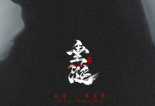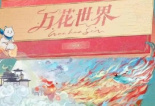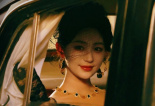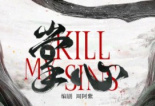frontier poet
The frontier fortress poetry of the prosperous Tang Dynasty has a lofty artistic conception and a tragic style. It is like a powerful bugle, and the history is filled with excitement every time it is blown.

The frontier poets in the prosperous Tang Dynasty had broad visions and exciting minds, full of majestic romantic temperament and indomitable heroic spirit.They sang the strongest voice of the times and fully embodied the spirit of the prosperous Tang Dynasty. They were unique wonders in the ancient poetry world and an elusive peak for later generations of poets.
Among these frontier poets, Wang Changling was the one who wrote the most and best seven-character quatrains.Qijue began to mature in the early Tang Dynasty, but its expressive ability has not been fully explored, and there are not many excellent works. Wang Changling, with his successful creative practice, brought the summary ability of Qijue to the extreme. He was the same writer as Li BaiThe poet with the highest achievement in quatrains, some even say that he surpasses Li Bai.He is very famous.There is "Poet Emperor Wang Jiangning."” the reputation.So he was called Wang Jiangning, maybe because he was from Jiangning, or because he was an official in Jiangning.The seven poems in his group of poems - Military March - are almost all fine works, revealing the psychological activities of frontline soldiers from various angles.For example, the fourth song:
Qinghai is covered with long clouds and dark snow-capped mountains, and the lonely city looks out over Yumen Pass.Yellow sand will wear golden armor in a hundred battles, and Loulan will never be returned until it is broken.
The sentence "Qinghai Changyun Dark Snow Mountain" exaggerates the atmosphere of war in a very full and hearty way: "Huangsha Hundreds of Battles and Golden Armor" not only reveals the hardship of the environment, but also shows the heroic spirit of the soldiers who ignored the country.
The pipa dances to a new sound, and the feeling of farewell is always lost in the mountains.I can't hear endless sorrow while being confused. The high autumn moon shines on the Great Wall.
In the Baichi Tower in the west of Fenghuo City, I sit alone in the sea breeze and autumn at dusk.I even play the Qiang flute to close the mountains and the moon, and I don’t have the worries of the golden boudoir.
This kind of sadness of missing my wife thousands of miles away is so helpless, because every time I miss her may be the last time, because once I go to war, I may never come back to this place.This is real lovesickness with bloodshot eyes!“If Loulan is not broken, it will never be paid back”. Although he is full of heroic spirit, the poet also saw the pain that the war brought to ordinary soldiers, and did not blindly indulge in the fantasy of meritorious service and title.
His "Out of the Fortress" is a famous piece of ancient and modern legends, and is known as the masterpiece of quatrains in the Tang Dynasty.
In the bright moon of Qin and the Pass of Han, the people who marched thousands of miles have not returned, but the flying generals of Dragon City are still there, and they will not teach Hu Ma to cross the Yin Mountains.
It is said that "the moon shines brightly in the Qin Dynasty and the Han Dynasty passes at the border". The actual meaning is that a bright moon shines on the border.However, when the desolate artistic conception of the bright moon shining on the border was pushed back to the Qin and Han Dynasties, this sentence changed from describing the real scene in front of us to a virtual scene full of historical depth. The virtual and the real complement each other, making the connotation of this poem extremely profound..This means that since the Qin and Han Dynasties, generations of people have been carrying out such long marches of thousands of miles, and many people died at the border and never returned.He lamented that there were no Dragon City flying generals like Li Guang to stop Hu Ma from crossing the Yinshan Mountains. He lamented that he was useless and could not serve the country and make contributions to the frontier. He also deeply sympathized with the border soldiers who had been fighting for a long time and could not return home.pain.The poet does not know and cannot know how to avoid the recurrence of this historical tragedy.He could only imagine that the flying general Li Guang would appear and use war to stop the war, but at the same time he also deeply realized that in the old days of the Great Wall battle, the salty words were high-spirited, the yellow dust is enough in the present and the past, and the bones are cluttered with wormwood“ (《Sai Xia Qu》) Even if war can be used to stop war, it will still be ”bones and bushes“, and it is also a tragedy. This poem is particularly catchy to read. Each sound matches the sounds before and after it. We focus on the harmony of the tone.After reading it once, you will know: ”The bright moon of the Qin Dynasty and the pass of the Han Dynasty, the people of the long march of thousands of miles have not returned, but the flying generals of the Dragon City are still there, and Hu Ma is not taught to cross the Yin Mountains.%
There are conscripted husbands at the border, and there are resentful women in the interior.His story - The Feud of a Friend - is about a wife who misses her husband who is away in the army:
The young woman in her boudoir didn't know her worries. She went up to the green building with makeup on the spring day. Suddenly she saw the color of willows on the street and regretted teaching her husband to look for a title.
His farewell poem - Farewell to Xin Jian at Furong Tower - is also a unique and famous poem:
Entering Wu in the cold rainy night, I see off my guests in Chu Shangu in the morning.Relatives and friends in Luoyang ask each other like a heart filled with ice in a jade pot.
Wang Changling's good friend Wang Zhihuan claimed to be a heroic man when he was young. He loved fencing, hunting, and singing tragic songs.He was famous for his poetry and was an important family among the frontier poets. Unfortunately, his fate was unfortunate and his collection of poems was lost. Only six quatrains have been handed down.According to records, one time he, Wang Changling, Gao Shi and others went to a hotel to sing and drink, and a group of artists happened to come. So they agreed that when these artists sang later, whoever sang the most poems would be the one with the greatest poem title., as a result, one musician sang two quatrains by Wang Changling, and the other sang one quatrain by Gao Shi. Wang Zhihuan said: The musicians sang music that country people listen to.Just wait and see!Sure enough, a beautiful geisha stood up and sang:
Far up the Yellow River among the white clouds, there is an isolated city called Wanren Mountain.Why should the Qiang flute blame the willows? The spring breeze does not pass through Yumen Pass.
The geisha sang two more songs in a row, both poems by Wang Zhihuan.From this anecdote in the literary world, we can see how famous his poems were at that time. This poem - Liangzhou Ci - is a famous poem in Tang poetry.The Yellow River flows out from the white clouds, and an isolated city is surrounded by tens of thousands of mountains, showing the desolate and majestic scenery of the frontier fortress.The third sentence "Why should the Qiang flute blame the willows" can refer to the Qiang flute playing the tune of "folding willows" to express homesickness, or it can also refer to the Qiang flute whimpering as if complaining that the willows outside the wall will not bloom and turn green.To cover up the coldness.The whole poem not only expresses the hard work of recruiting people, but also has a heroic momentum.Far above the Yellow River, among the white clouds, is an isolated city called Renshan Mountain.Why should the Qiang flute blame the willows? The spring breeze does not pass through Yumen Pass.
As the day fades behind the mountains, the Yellow River flows into the sea.If you want to see a thousand miles away, go to the next level.
Even a three-year-old child can recite this song - Climbing the Stork and Magpie Tower.The poet climbed up to the Stork and Magpie Tower in Yongji County, Shanxi Province, and looked at the bleak sun setting in the west and the rolling Yellow River flowing eastward. His sight stretched to the east and west, making the field of vision infinitely broad.The last two sentences move from reality to imaginary, and then push it a step further to broaden the horizons again.Four sentences with twenty words, no strange words, no strange sentences, no strange scenery, no strange feelings, but it shows such majestic momentum, this is simply a miracle!As the day fades behind the mountains, the Yellow River flows into the sea.If you want to see a thousand miles away, go to the next level.
Another poet of the same period, Wang Han, also had a widely circulated poem - Liangzhou Ci -
The luminous cup of grape wine reminds you immediately if you want to drink Pipa.Don't laugh when you are lying drunk on the battlefield. How many people have fought in ancient times!
Grape wine is poured into luminous cups, and a military band plays the pipa on horseback to add to the fun. How can the soldiers who are about to go to the front not drink!The lyrical protagonist is also somewhat helpless in his heart, but his heroic spirit cannot be overpowered, and his mood is still optimistic.This kind of poem can only be written by people in the prosperous Tang Dynasty, and only people in the prosperous Tang Dynasty can feel the pain of death with such a smile.The luminous cup of grape wine reminds you immediately if you want to drink Pipa.Don't laugh when you are lying drunk on the battlefield. How many people have fought in ancient times!
Another important frontier poet, Li Qi, was also good at writing seven-character ancient poems.He doesn't care much about fame and wealth, but he really wants to be a god. He takes cinnabar and looks forward to ascending in the daytime.Wang Wei said in his poem "Gift to Li Qi", "I heard that the cinnabar used by you is very good in color. I don't know when I will have wings from now on." Li Qi's most famous poem is "Ancient Military Journey":
During the day, I climbed the mountain to watch the beacon fire, and at dusk, I drank my horse by crossing the river.Pedestrians are fighting in the wind and the sand is dark, and the princess Pipa is full of resentments.There are no city outlines in the wild clouds, and rain and snow are falling all over the desert.Hu Yan flies away night after night with a cry, Hu'er sheds tears in both eyes. Hearing that the jade gate is still covered, his life should be thrown into a light car, his bones buried in the wilderness year after year, and the sweet apples entering the Han family are empty!
What is commendable is that Li Qi not only sympathized with the Han soldiers who heard that the Yumen was still covered and had to throw their lives away, but also saw the suffering that the war brought to the ethnic minorities.“Hu'er's tears are both falling” and then “Hu Yan's whining and flying every night” are used to set off. The two images of Hu Yan's pleading and Hu'er's tears are superimposed together. What a heart-piercing aesthetic stimulation!Li Qi's ideological realm was not achieved by other frontier poets with strong anti-war tendencies.Just for this sentence, the Chinese people should build a huge bronze statue deep in their hearts to commemorate him.
The most representative poets among the frontier poets are Gao Shi and Cen Can, who were collectively called Gao Cen in later generations.
Gao Shi's character is somewhat similar to Li Bai's, with a very similar arrogance and arrogance.He said in "Biewei joins the army" that he had twenty-one swords and traveled westward to Chang'an City. He raised his head to look at the king's gate and took the minister with his fingers.The prosperous Tang Dynasty was an era of madmen, and naturally Li Bai was not the only one.He is not as talented as Li Bai, but he has practical political talents.Throughout the Tang Dynasty, among the great poets, Gao Shi had the most outstanding political talent and the greatest official career.
“The smoke and dust of the Han family are in the northeast, and the Han generals will resign and destroy their families.A man is proud of himself, but the emperor gives him great honor.I beat the drums with gold and went down to Yuguan, and the flags meandered among the jieshi.Xiao Weiyu flew out into the vast sea, and Shanyu's fierce fire shone on Langshan.The mountains and rivers are desolate and borderless, and the barbarian cavalry and the mausoleum are mixed with wind and rain.The warriors are half dead in front of the army, but the beauties are still singing and dancing under the tent.The desert is poor and the grass is blocked in autumn, and the lonely city is sparse in battle at sunset.When encountering kindness, one always underestimates the enemy, and even though one has exhausted all his strength, he has not been able to clear the siege.The iron robes have been guarding for a long time, and the jade chopsticks should be heard after parting.The young woman in the south of the city wants to have her heart broken, and the conscript Ji Beikong looks back.The edge of the court can be saved, but the vastness of the expanse is even more limitless.The murderous spirit forms clouds at three o'clock, and the cold sound spreads all night long.Looking at each other, there is a lot of blood. I never care about Xun in the death festival. You don't see the hardships of fighting on the battlefield. I still remember General Li to this day!《Yan Xingge》about a wife missing her husband who is away at war. This is an old poem title that has been used by everyone since the Three Kingdoms period.Although Gao Shi's poem still wrote "The woman in the south of the city is heartbroken, and the conquest of the Jibei sky looks back", it breaks through the limitations of this traditional theme, from the mentality of the soldiers when they go to war, the urgency of the war, the cruelty of the war, toThe unevenness of joy and sorrow in the army, conscripts missing their wives, yearning for peace, etc. are all linked together.This poem is like a march accompanied by percussion instruments. The rhythm is strong and calm, and the sound is so majestic that people can't help but feel refreshed after listening to it.
Gao Shi is good at writing seven-character ancient poems, which are magnificent, turbulent in opening and closing, and have strong appeal.His poems are by no means many, but there are a few that can be as great as the small ones, with rich connotations and lofty realms.
Thousands of miles of yellow clouds and white sun, and the north wind blows the geese and snow.Don't worry about the road ahead. No one in the world knows you!
The poet first tried his best to exaggerate the desolation of the environment when they broke up: yellow clouds thousands of miles away, the day was dark, the north wind blew snow, and the wild geese returned south.Breaking up with friends in this kind of climate will naturally make you feel even heavier.But the third and fourth sentences suddenly cheered up and drew a bright color on the dark sky, making the atmosphere relaxed.This shows the broad-mindedness of the people in the prosperous Tang Dynasty.”Don't worry about the road ahead. No one in the world knows you“. With Wang Bo's ”knowing him in the world, he will be a little more heroic and a little more confident.
Cen Shen was the most typical frontier poet in the prosperous Tang Dynasty. In the 1850s, he went to the frontier twice and stayed in Xinjiang for six years.We should grasp the characteristics of his frontier poems from two aspects.First, he is a curious person, just as Du Fu said, "Brothers Cen Shen are all curious" (《Meilingxing》).In his early years, he enjoyed discovering poetry from unexpected angles.After having the experience of frontier life, his curious nature also opened up a new world.
Second, there is an indomitable heroic spirit in Cen Shen's poems, which is unmatched by other frontier poets.He praised others for only getting their fame from horses. They were really heroic husbands. This was how he himself galloped on the northwest battlefield as a young hero in uniform.When he left the country, he was only in his early thirties, an age full of vigor.Wang Changling, Gao Shi and other older poets have begun to realize the cruelty and injustice of war as the prosperity of the Kaiyuan Dynasty gradually shrunk and the government became increasingly corrupt. However, Cen Shen was still shouting and galloping on the battlefield to show off.Heroism.This mentality and ideological realm make his poetry more obviously different from that of Gao Shi.Gao Shi observed more deeply and saw more of the hardships of the soldiers, so the color of the poem was lighter.Cen Shen used a gorgeous style of writing to highlight the exotic scenery of ice, snow, volcanoes, and hot seas in the northwest, praising the war to defend the frontier, and praising the soldiers' perseverance and heroic ambition to serve the country with meritorious service, which is touching and strange.
Don’t you see, the horse-drawn river is running along the snowy seaside, and the flat sand is vast and yellow in the sky.The wind roared on the September night in Luntai, and the gravel in the river was as big as a bucket, and the stones were scattered all over the ground in the wind.The Xiongnu grass is yellow and the horses are fat, smoke and dust are seen flying in the west of Jinshan Mountain, and the generals of the Han family are marching west.The general's golden armor stayed on all night, and the troops fought against each other in the middle of the night. The limelight was like a knife cutting through the face.The horse hair is covered with snow and sweat is steaming, the five-flowered money is swirled into ice, and the grass and inkstone in the curtain are condensed with water.The captive cavalry should be frightened when they hear this. Unexpectedly, they don't dare to fight with short soldiers, and the chariot driver Ximen stands still to show off his victory.
The poem says that a general of the Han Dynasty set out to the west and marched in the harsh climate of Luntai in September, when the wind howled on the night, and the gravel in the river was as big as a bucket, and the ground was covered with stones in the wind.Just from the rendering of this atmosphere, people can feel that this is an invincible iron army, so the poet confidently concluded that the cavalry should be frightened after hearing this, so they should stand at the west gate of the chariot division to show their victory..This kind of indomitable fighting spirit is difficult to find in the poems of other frontier poets.
《Bai Xuege sends Judge Wu back to the capital》is another important work of the poet.This poem makes people feel novel from the beginning.“Hutian It is snowing in August. According to common sense, this kind of weather should make people feel bleak and gloomy.However, as a curious young man during the prosperous Tang Dynasty, Cen Shen suddenly had a whim and thought that what was lying on the branches was not snow, but pear blossoms in full bloom. Suddenly, as if a spring breeze came overnight, thousands of pear blossoms bloomed on the trees.When these two verses, which are still often quoted, are placed here, the dark sky suddenly becomes brighter and the air suddenly becomes warmer, thus setting the heroic and optimistic tone of the whole poem.”The Chinese army prepared wine and drinks for returning guests, and played harps, lutes, lutes and harp flutes“, showing an exotic atmosphere.The poet's sharp eyes also particularly noticed the red flag held high above the camp gate. The red flag was set off by the white snow, and the color contrast was so strong.The red flag should be fluttering in the wind, but sometimes it hangs still when the wind stops.This special situation made the poet wonder again: it seems that it is not the wind that forces the flag to unfold motionless, but that the flag is frozen and cannot be blown by the strong wind.Framing the scene with a curious eye and describing it with a surprising style of writing, a very ordinary farewell scene is painted so beautifully and boldly that people will never tire of reading it:
Bai Xuege sends Judge Wu back to Beijing
The north wind blows and the white grass on the ground folds, and the sky is full of snow in August. Suddenly, like a spring breeze coming overnight, thousands of pear trees bloom.Scattered into the pearl curtain and wet Luo curtain, the fox fur is not warm and the brocade quilt is thin.The general's horns and bows cannot be controlled, and the protective armor is still cold.The vast sea is covered with hundreds of feet of ice, and the melancholy clouds are bleak and condensed thousands of miles away.The Chinese army prepares wine and drinks for the returning guests, playing fiddles, lutes, lutes and flutes.Snow falls one after another on the camp gate, and the red flag is blown by the wind and does not turn over due to the freezing cold.I saw you off at the east gate of Luntai. When you left, the mountain road was covered with snow. You were nowhere to be seen on the winding road, and there was a place for horses to walk in the sky above the snow.
Mention should also be made of Cui Hao, who is also famous for writing ancient poems.Some people even say that during the Kaiyuan and Tianbao years of Emperor Xuanzong of the Tang Dynasty, that is, in the first half of the eighth century, he and Wang Wei were the most famous poets.This at least shows that he was a famous figure at the time.”Gaoshan Daijun is adjacent to Yan in the east, and is close to the Hu family in Yanmen.Free the Hu Ying to chase the birds, and hunt the Akita on behalf of the horse.The wild fires on the mountaintops are burning in the cold, and the lonely peaks are wet and smokey in the rain.I heard that there was no fighting in western Liaoning, so I often slept in restaurants drunkenly.(《Yanmen Hu Renge》) This poem describes the brave and martial, rough and heroic spiritual outlook of the ethnic minorities in the border areas. It is really vivid and colorful.However, his name is connected with the immortal seven-rhythm poem - Yellow Crane Tower. It is better to read this poem directly:
People in the past have gone away on the Yellow Crane, and the Yellow Crane Tower is empty here. Once the Yellow Crane is gone, it will never come back, and the white clouds will remain empty for thousands of years.Qingchuan is full of Hanyang trees, and the grass is luxuriant and Parrot Island is green.Where is the Rimu Township Pass?The smoke on the Yanbo River makes people sad.









